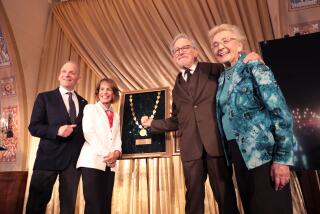Jeshajahu ‘Shaike’ Weinberg; Israeli Established Holocaust Museum in Washington
- Share via
Jeshajahu “Shaike” Weinberg, the visionary founding director of the U.S. Holocaust Memorial Museum in Washington, D.C., who helped ensure that visitors gained vivid insight into European Jews’ lives in the ghettos and Nazi death camps of World War II, has died. He was 81.
Weinberg, who was also founding director of the Jewish Diaspora Museum in Tel Aviv, died Saturday in Tel Aviv of a stroke.
He came out of retirement in 1988 to give Washington and the United States the museum that New Republic magazine has called “a pedagogical masterpiece.” The museum opened in April 1993, and years later people were still lining up each morning for tickets.
Originally, Weinberg intended to remain at the museum just a short time, and certainly not beyond its opening. But he guided the popular new institution into 1995 before resuming his retirement in Israel.
“I came originally as a consultant. I stayed because at that time there was nobody else to put this museum together,” he said in 1993. “I don’t regret having done it. It is probably the most important thing I have done in my life--because of the importance of the subject matter and the importance of the educational task that this museum will help to fulfill.”
Weinberg said the museum might not be able to prevent a repeat of the Holocaust, adding: “All we can do is to try and educate people to make them understand how civilization can break down.”
Capping his long career as a theater and museum director in Israel, Weinberg gave the United States a tangible documentary of the Nazi extermination of Jews, Gypsies, homosexuals, mentally handicapped people, Catholics and others they viewed as “subhuman.”
He supervised the historical research and collected the exhibit items--ranging from a railroad car that transported Jewish prisoners to a death camp, to an entire Auschwitz barracks and 4,000 pairs of victims’ shoes--that shaped the landmark museum.
Weinberg’s work at the Washington and Tel Aviv museums earned him the 1999 Israel Prize for lifetime achievement, the most prestigious award that nation gives its citizens.
“He introduced the concept of the museum as a tool for telling a story, not just for showing authentic artifacts,” said Anita Shapira, a professor of Jewish history at Tel Aviv University who worked with Weinberg.
Born in Warsaw, Weinberg moved to Palestine with his family as a teenager in 1933 and lived on a kibbutz. He was an ardent socialist throughout his life, and in 1939, Weinberg and other members of his Marxist-Zionist youth movement established Kibbutz Elon.
From 1935 until Israel became an independent state in 1948, Weinberg volunteered with the Hagana, the Jewish paramilitary self-defense organization that opposed British rule. During World War II, he served in the British Army’s Jewish Brigade.
After working as a technical administrator on the Israeli prime minister’s staff, Weinberg served as director of the Cameri Theater, Tel Aviv’s municipal theater, from 1961 to 1976. He was a president of the Israeli Center of UNESCO’s International Theater Institute.
He spent the next eight years as director of the Jewish Diaspora Museum in Tel Aviv, and was a consultant to the Museum of History of Jerusalem, the Museum of Jewish Heritage in New York, and the Jewish museums of Berlin and Warsaw.
Widowed since 1992, Weinberg is survived by a son and three daughters.
More to Read
The biggest entertainment stories
Get our big stories about Hollywood, film, television, music, arts, culture and more right in your inbox as soon as they publish.
You may occasionally receive promotional content from the Los Angeles Times.










